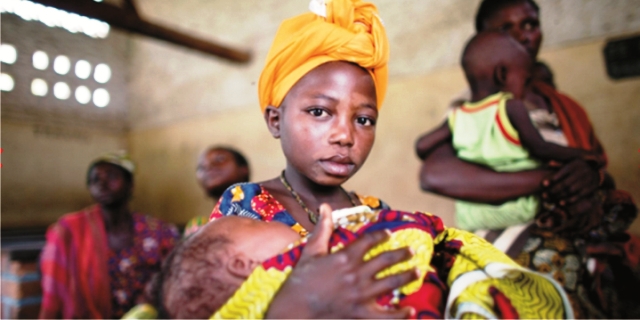Opinion
The Plight OF Early Marriage

The issue of young girls being forced into early marriage remains a dangerous development. Our young girls in the rural areas suffer the most casualties in this matter. Most of the girls accept to be married off because of the hard economic condition they are faced with.
At the tender ages these girls marry, one wonders what they know about pregnancy and child rearing. Are they mature enough to bathe themselves how much less take care of a husband?
As earlier stated, this issue of early marriage is caused by poverty and illiteracy. Lack of self awareness is an added cause of this social ill. Some parents that give out their daughters in marriage do so because they can hardly feed themselves. That is why they give them out to wealthy men from whom they get what to eat and address their basic problem of hunger. Some of the parents also lack decent accommodation and are unable to send their children to school hence, the decision to give them out early in marriage.
In a recent research that was conducted in a rural community in Ahoada West Local Government Area of Rivers State, it was discovered that 89 per cent of young ones were uncatered for and so could hardly fend for themselves. The result of this is that the girls among them are forced into early marriage by the circumstances they have found themselves. With the discovery made at Ahoada West LGA, it is clear that many victims of child marriage are either forced into it by parents or circumstances.
I do not agree with the view that some of the under-aged girls involved in this practice do so of their own volition. Even if there are cases of such, they are very few compared to the lot. The truth is that these girls are too young to understand the implication of their decision and that is why they jump into it. Some jump out almost immediately while others remain per haps due to threats of being ostracised by their families. Given this type of situation, can we say the under-aged girls who are victims of this practice are exercising their right to choose? Not in the least!
The assumption is made that once a girl is married, then she has attained marriageable age which the constitution puts at 18 years. This section of the constitution has to be amended or expunged else the reverse will also be true of the boys. That is, if a boy marries while he is under age, then he automatically becomes a man.
While early marriage takes place different forms and shapes, one issue is paramount about it and that is, it is a violation of the right of the victim. I am talking about the right to freely enter into the union without being forced into it. The right to free consent to a marriage is recognised by the 1948 Universal Declaration of Human Rights (UDHR). It is also recognised in other human rights charges. When one partner is so immature, consent cannot be said to be free.
Early marriage had several impacts which are physical, intellectual, psychological and emotional. But an effect stands out clearly. It robs the child the right to at least basic education. For girls, who are always victims of these ills, they face the danger of premature pregnancy and child-bearing. Because of their innocence as a result of their immaturity, some of them are sexually-abused by their so-called husbands while they remain helpless. Also, this type of marriage produces high divorce rate.
Given all that has been said, I think the government has to act very fast. The first step must be to amend all relevant laws that give impetus to the vice practice. Secondly, awareness has to be created particularly among young girls (under-aged) of the dangers of early marriage. Then finally, government at different levels have to identify girls that are prone to this practice and provide them assistance such that they can hardly be tempted into early marriage.
Every young person needs education. To this end, free and compulsory education should be made available to our young ones in the country. Since education is an instrument of enlightenment, many of them will be in a position to weigh the pros and cons of early marriage, before deciding on it.
Chizoba is a student of Abia State University.
Igwe Chizoba
Opinion
Why Reduce Cut-Off Mark for C.O.E ?
Opinion
Welcome! Worthy Future For R/S
Opinion
Restoring Order, Delivering Good Governance
The political atmosphere in Rivers State has been anything but calm in 2025. Yet, a rare moment of unity was witnessed on Saturday, June 28, when Governor Siminalayi Fubara and Minister of the Federal Capital Territory, Chief Nyesom Wike, appeared side by side at the funeral of Elder Temple Omezurike Onuoha, Wike’s late uncle. What could have passed for a routine condolence visit evolved into a significant political statement—a symbolic show of reconciliation in a state bruised by deep political strife.
The funeral, attended by dignitaries from across the nation, was more than a moment of shared grief. It became the public reflection of a private peace accord reached earlier at the Presidential Villa in Abuja. There, President Bola Ahmed Tinubu brought together Governor Fubara, Minister Wike, the suspended Speaker of the Rivers State House of Assembly, Martin Amaewhule, and other lawmakers to chart a new path forward.
For Rivers people, that truce is a beacon of hope. But they are not content with photo opportunities and promises. What they demand now is the immediate lifting of the state of emergency declared in March 2025, and the unconditional reinstatement of Governor Fubara, Deputy Governor Dr. Ngozi Odu, and all suspended lawmakers. They insist on the restoration of their democratic mandate.
President Tinubu’s decision to suspend the entire structure of Rivers State’s elected leadership and appoint a sole administrator was a drastic response to a deepening political crisis. While it may have prevented a complete breakdown in governance, it also robbed the people of their voice. That silence must now end.
The administrator, retired naval chief Ibok-Ette Ibas, has managed a caretaker role. But Rivers State cannot thrive under unelected stewardship. Democracy must return—not partially, not symbolically, but fully. President Tinubu has to ensure that the people’s will, expressed through the ballot, is restored in word and deed.
Governor Fubara, who will complete his six-month suspension by September, was elected to serve the people of Rivers, not to be sidelined by political intrigues. His return should not be ceremonial. It should come with the full powers and authority vested in him by the constitution and the mandate of Rivers citizens.
The people’s frustration is understandable. At the heart of the political crisis was a power tussle between loyalists of Fubara and those of Wike. Institutions, particularly the State House of Assembly, became battlegrounds. Attempts were made to impeach Fubara. The situation deteriorated into a full-blown crisis, and governance was nearly brought to its knees.
But the tide must now turn. With the Senate’s approval of a record ?1.485 trillion budget for Rivers State for 2025, a new opportunity has emerged. This budget is not just a fiscal document—it is a blueprint for transformation, allocating ?1.077 trillion for capital projects alone. Yet, without the governor’s reinstatement, its execution remains in doubt.
It is Governor Fubara, and only him, who possesses the people’s mandate to execute this ambitious budget. It is time for him to return to duty with vigor, responsibility, and a renewed sense of urgency. The people expect delivery—on roads, hospitals, schools, and job creation.
Rivers civil servants, recovering from neglect and under appreciation, should also continue to be a top priority. Fubara should continue to ensure timely payment of salaries, address pension issues, and create a more effective, motivated public workforce. This is how governance becomes real in people’s lives.
The “Rivers First” mantra with which Fubara campaigned is now being tested. That slogan should become policy. It must inform every appointment, every contract, every budget decision, and every reform. It must reflect the needs and aspirations of the ordinary Rivers person—not political patrons or vested interests.
Beyond infrastructure and administration, political healing is essential. Governor Fubara and Minister Wike must go beyond temporary peace. They should actively unite their camps and followers to form one strong political family. The future of Rivers cannot be built on division.
Political appointments, both at the Federal and State levels, must reflect a spirit of fairness, tolerance, and inclusivity. The days of political vendettas and exclusive lists must end. Every ethnic group, every gender, and every generation must feel included in the new Rivers project.
Rivers is too diverse to be governed by one faction. Lasting peace can only be built on concessions, maturity, and equity. The people are watching to see if the peace deal will lead to deeper understanding or simply paper over cracks in an already fragile political arrangement.
Wike, now a national figure as Minister of the FCT, has a responsibility to rise above the local fray and support the development of Rivers State. His influence should bring federal attention and investment to the state, not political interference or division.
Likewise, Fubara should lead with restraint, humility, and a focus on service delivery. His return should not be marked by revenge or political purges but by inclusive leadership that welcomes even former adversaries into the process of rebuilding the state.
“The people are no longer interested in power struggles. They want light in their streets, drugs in their hospitals, teachers in their classrooms, and jobs for their children. The politics of ego and entitlement have to give way to governance with purpose.
The appearance of both leaders at the funeral was a glimpse of what unity could look like. That moment should now evolve into a movement-one that prioritizes Rivers State over every personal ambition. Let it be the beginning of true reconciliation and progress.
As September draws near, the Federal government should act decisively to end the state of emergency and reinstate all suspended officials. Rivers State must return to constitutional order and normal democratic processes. This is the minimum requirement of good governance.
The crisis in Rivers has dragged on for too long. The truce is a step forward, but much more is needed. Reinstating Governor Fubara, implementing the ?1.485 trillion budget, and uniting political factions are now the urgent tasks ahead. Rivers people have suffered enough. It is time to restore leadership, rebuild trust, and finally put Rivers first.
By: Amieyeofori Ibim
Amieyeofori Ibim is former Editor of The Tide Newspapers, political analyst and public affairs commentator
-

 Business2 days ago
Business2 days agoReplace Nipa Palms With Mangroove In Ogoni, Group Urges FG, HYPREP
-
News1 day ago
South-South contributes N34trn to Nigeria’s economy in 2024 – Institute
-
Niger Delta2 days ago
Police Rescue Kidnap Victim, Recover Pistol In A’Ibom
-

 Politics1 day ago
Politics1 day agoINEC Trains Political Parties Officials On ICNP Use Ahead By-Elections
-

 Business2 days ago
Business2 days agoIndustry Leaders Defend Local Content, … Rally Behind NCDMB
-

 Business1 day ago
Business1 day agoNCDMB, Dangote Refinery Unveil JTC On Deepening Local Content
-
Niger Delta2 days ago
C’River Hands Over Rubber Plantation to Private Company
-
Rivers2 days ago
Macobarb CEO Cries Out, Says No Indigenous Contractor Can Win Case Against NLNG Or Oil Majors in Nigerian Courts …As Justice Nwogu Throws Out Macobarb’s N5.74bn Claim

